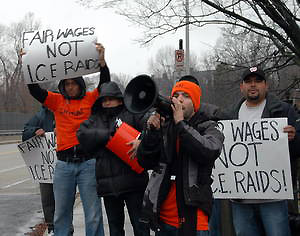
ARLINGTON, Va. – Don’t look now, but the federal Immigration and Customs Enforcement agency (ICE) may be back to its old tricks of raiding employers on suspicion of finding undocumented workers – workers who just happen to be standing up for their rights.
But instead of doing so at meatpacking plants in Iowa and Nebraska, the feds are carrying out their newest swoops on construction contractors in Northern Virginia.
The Internet record turns up dozens of arrests in the last several years in that area. The latest instance was last month at Corinthian Contractors, just across the Potomac River from the nation’s capital. The effect of the raid, which affected almost 20 workers, prompted a Jan. 15 protest at the firm’s Arlington, Va., headquarters.
The protest spotlights not just the arrests of the workers, but ICE’s role in going after workers who stand up for their rights. Workers advocates from the National Day Laborers Organizing Network and Jobs With Justice, plus Arlington County Board Chairman Walter Tejada joined the protest line, despite rain and fog.
“One of the points of the protest is to draw attention to the problem, because what was done is illegal and unseemly,” says Nicole Duarte, spokeswoman for the Laborers-sponsored Mid-Atlantic Regional Organizing Coalition.
ICE gained a reputation during the GOP Bush government for such raids, especially when organizing drives occurred. The most-notorious came at six meat packing plants in the Midwest and Great Plains states owned by what was then the Armour Company, a longtime name in U.S. meatpacking.
Those raids, which also came as the United Food and Commercial Workers was trying to organize employees at most of the plants, rounded up 1,500 workers, virtually all of them with Spanish surnames. Only 82 were undocumented. The raids also crippled Armour so much – it had to shut its entire operations for at least a week – that it eventually had to sell out to a Brazilian meatpacker.
In Arlington in early December, Duarte explained, some half a dozen workers discovered that Corinthian was not paying them the local prevailing wage for a federally funded construction project. Each was losing between $5 and $10 an hour.
The workers, all of them Hispanic-named, consulted a coalition organizer, who told them of their rights to complain to the employer – and to appropriate authorities. Which they did. Several days later, on Dec. 6, ICE swooped in. The coalition doesn’t know if the employer called the agency, but the coincidence is “suspicious,” Duarte said.
ICE picked up and jailed all six workers, plus two bystanders. Agents arrested the workers while they waited in front of their foreman’s house for him to give them a lift to work. Of the six, two await immigration hearings, one has been deported, one quit voluntarily and two were fitted with tracking bracelets. The bystanders were released.
The ICE raid had a spinoff: Corinthian ordered other workers to bring proof of their legal right to work in the U.S., the I-9 forms that ICE now requires all employers to file for every newly hired worker. And Corinthian checked those against ICE records. The result: The firm fired 13 more workers, including one with his papers in order.
The common denominator for all 19 workers who lost their jobs: They had signed a letter to Corinthian saying they wanted and were entitled to the prevailing wage for their jobs, as the law specifies.
The ICE raid, and the letter that precedes it, also spotlights another common problem involving Spanish-speaking workers in the non-union sector of the construction industry: Wage theft. “Almost half of day laborers, who tend to focus on construction, have had their wages stolen” by underpayment or non-payment, reports Kim Bobo, director of the Interfaith Workers Justice, in her book Wage Theft in America.










